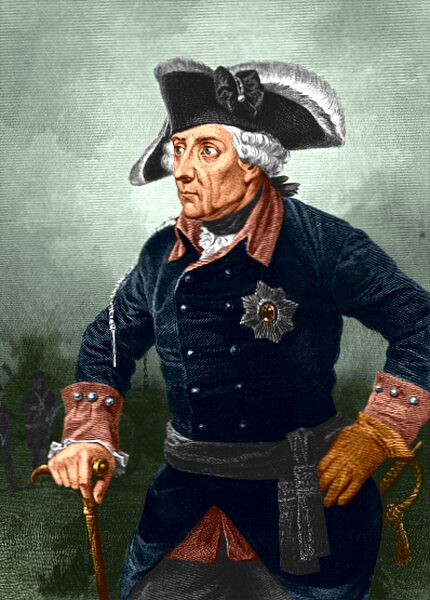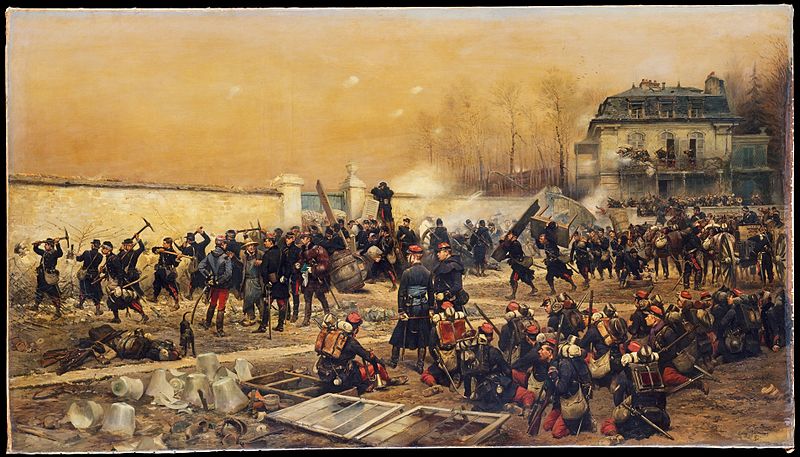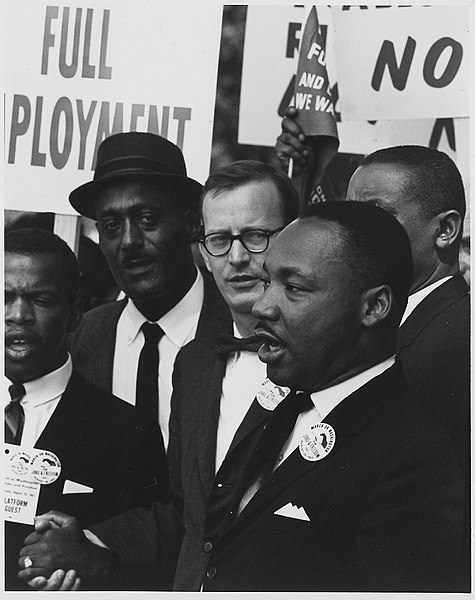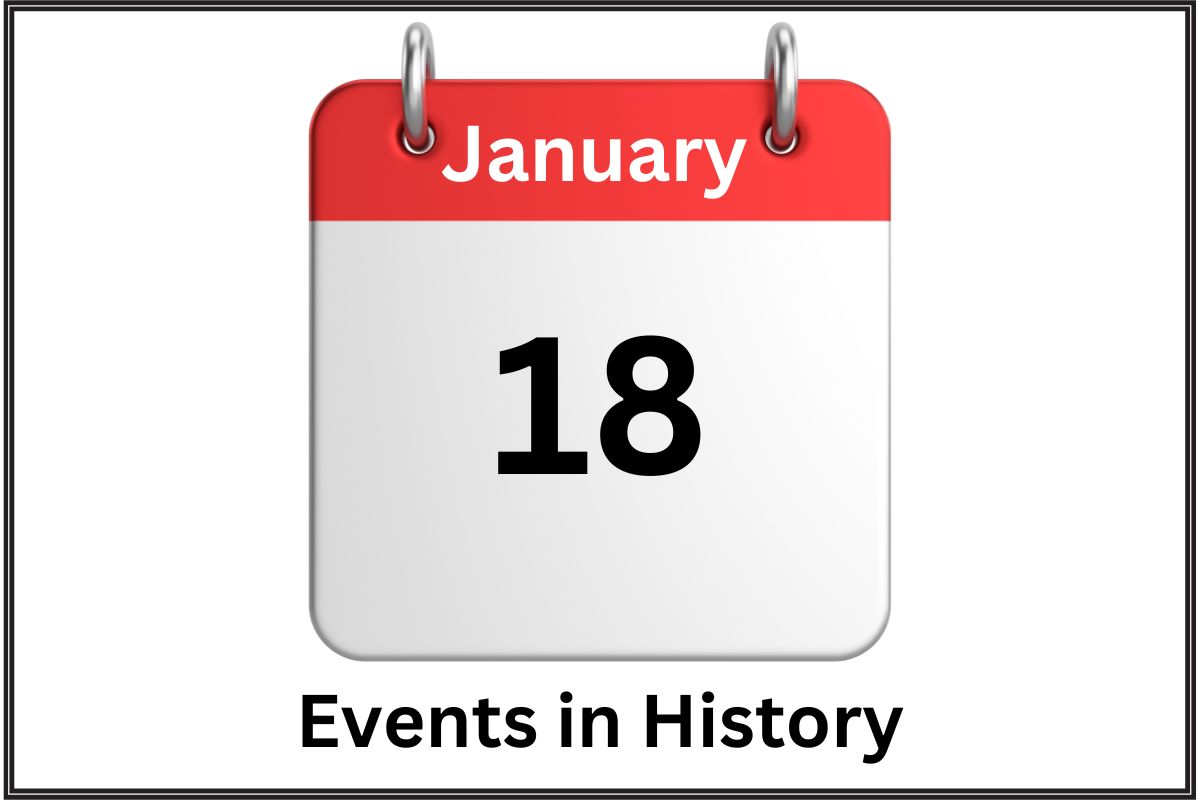This article explores a curated selection of pivotal historical events that transpired on January 18th, spanning a wide array of domains including politics, science, culture, and significant societal shifts
Each segment of the article delves into the significance and broader implications of these events, offering insights into how they shaped the course of history and influenced the world we live in today.
From the crowning of kings and groundbreaking scientific achievements to landmark moments in civil rights and the end of long conflicts, this journey through time highlights the diversity of human experience and the enduring impact of these moments across centuries.
January 18th Events in History
350 – General Magnentius deposes Roman Emperor Constans and proclaims himself Emperor
General Magnentius, a high-ranking officer in the Roman army, led a revolt against Emperor Constans, who was one of Emperor Constantine the Great’s three sons and had been ruling the western part of the Roman Empire. On January 18, 350, Magnentius declared himself Emperor after deposing and killing Constans.
Also Read: January 17 – On this Day in History
His rebellion was significant because it marked a period of instability and civil wars within the Roman Empire, contributing to its gradual decline. Magnentius’ rule was challenged by Constantius II, another son of Constantine, leading to a series of conflicts that ultimately resulted in Magnentius’ defeat and suicide in 353.
532 – The Nika riots break out in Constantinople, nearly destroying the city and resulting in the deaths of thousands
The Nika riots were a devastating week-long uprising against Emperor Justinian I in Constantinople, the capital of the Byzantine Empire. The riots began during a chariot race at the Hippodrome on January 13, 532.
They were fueled by political discontent among different factions and exacerbated by the rivalry between the chariot racing teams, the Blues and the Greens. The riots escalated, leading to the burning of much of the city and tens of thousands of deaths.
Also Read: January 19th Events in History
Justinian contemplated fleeing but, at the urging of his wife Theodora, decided to stay. He then ordered his generals to suppress the uprising, which they did brutally by slaughtering the rioters trapped in the Hippodrome.

1486 – King Henry VII of England marries Elizabeth of York, uniting the houses of Lancaster and York
The marriage between Henry VII, the first Tudor king, and Elizabeth of York, on January 18, 1486, was a pivotal event in English history.
It effectively ended the Wars of the Roses, a series of dynastic conflicts between the House of Lancaster (to which Henry belonged) and the House of York. By marrying Elizabeth, Henry united the feuding houses, symbolized by the creation of the Tudor Rose, combining the white rose of York and the red rose of Lancaster.
This marriage not only solidified Henry’s claim to the throne but also marked the beginning of the Tudor dynasty, which would rule England for over a century and preside over a period of significant economic, political, and cultural change, including the English Renaissance and the Reformation.
1535 – Francisco Pizarro founds the city of Lima, Peru
On January 18, 1535, Spanish conquistador Francisco Pizarro founded Lima, which he named Ciudad de los Reyes (City of Kings), as the capital of the Spanish possessions in the New World. Pizarro chose the location because of its proximity to the coast, enabling easy sea access, and its fertile valley, which was conducive to growing crops and sustaining a large population.
The establishment of Lima marked a significant moment in the Spanish colonization of the Americas, serving as a key administrative, economic, and religious center.
The city would go on to play a central role in the management of Spanish wealth extracted from South America and in the spread of Catholicism throughout the continent.
1670 – Henry Morgan captures Panama
Captain Henry Morgan, a Welsh privateer, led a daring expedition against the Spanish Empire and captured Panama City on January 18, 1670. Morgan had been granted a letter of marque by the English government, effectively making him a legal pirate with permission to attack Spanish ships and settlements.
His attack on Panama, one of the richest Spanish cities in the New World due to its position on the trade routes for silver and gold mined in the Americas, was one of the most audacious and successful operations of his career.
The capture and subsequent sack of Panama by Morgan and his men was a major blow to Spanish power in the region and underscored the vulnerability of Spanish possessions in the face of determined privateers and the growing naval power of England.
1701 – Frederick I crowns himself King of Prussia in Königsberg
On January 18, 1701, Frederick I took a significant step in European history by crowning himself as the first King of Prussia in Königsberg (now Kaliningrad, Russia).
This act was part of a larger political maneuvering within the Holy Roman Empire and was sanctioned by Emperor Leopold I in return for Frederick’s assistance against France in the War of the Spanish Succession.
The coronation of Frederick I was a crucial moment in the ascendancy of the Hohenzollern dynasty and marked the elevation of Prussia from a duchy to a kingdom. This new status not only enhanced the prestige of Frederick I and his successors but also set the stage for the rise of Prussia as a major European power in the centuries to come.

1778 – James Cook is the first known European to discover the Hawaiian Islands, which he names the “Sandwich Islands”
On January 18, 1778, during his third Pacific expedition, British explorer Captain James Cook became the first European to make contact with the Hawaiian Islands. He named them the “Sandwich Islands” in honor of John Montagu, 4th Earl of Sandwich, the First Lord of the Admiralty and Cook’s patron.
His arrival initiated the first recorded encounters between Europeans and the Native Hawaiian people, significantly impacting the islands’ culture, society, and eventually their political structure.
Cook’s discovery opened the Hawaiian Islands to the rest of the world, leading to increased trade, the spread of diseases to which the Native Hawaiians had no immunity, and eventually the colonization and annexation by the United States in the 19th century.
1788 – The first elements of the First Fleet carrying 736 convicts from England to Australia arrive at Botany Bay
On January 18, 1788, the first ships of the First Fleet arrived at Botany Bay, marking the beginning of European colonization in Australia. The Fleet consisted of 11 ships sent by the British government to establish a penal colony. It carried over 700 convicts, along with officers, marines, and their families, totaling about 1,300 people.
The arrival of the First Fleet is a pivotal event in Australian history, leading to the founding of the colony of New South Wales on January 26, 1788. This event also marks the beginning of the systematic European colonization of Australia, profoundly affecting the continent’s indigenous peoples through displacement, conflict, and the introduction of new diseases.
1871 – Wilhelm I of Germany is proclaimed Kaiser Wilhelm in the Hall of Mirrors of the Palace of Versailles towards the end of the Franco-Prussian War
The proclamation of Wilhelm I as German Emperor (Kaiser) on January 18, 1871, in the Hall of Mirrors at the Palace of Versailles, was a momentous event that marked the unification of Germany. This ceremony took place during the Franco-Prussian War, shortly before its conclusion, and was a deliberate choice to symbolize the dominance of Prussia and its allies over France.
The unification of Germany under Prussian leadership was the culmination of years of political and military efforts, primarily driven by Otto von Bismarck, the Chancellor of Prussia.
This event not only altered the political landscape of Europe by establishing the German Empire as a new power but also set the stage for future conflicts, including World Wars I and II.

1896 – An X-ray generating machine is exhibited for the first time by H.L. Smith
In 1896, just a year after Wilhelm Conrad Röntgen discovered X-rays, H.L. Smith showcased an X-ray generating machine for the first time. This demonstration highlighted the practical application of Röntgen’s discovery in medicine and other fields.
The ability to look inside the human body without surgery was revolutionary, offering unprecedented diagnostic capabilities. It marked the beginning of the field of radiology, which has become essential in medical diagnostics, treatment planning, and research.
This innovation paved the way for further advancements in medical technology and has had a lasting impact on healthcare and science.
1911 – Eugene B. Ely lands on the deck of the USS Pennsylvania stationed in San Francisco Bay, the first time an aircraft landed on a ship
On January 18, 1911, aviation pioneer Eugene Burton Ely achieved a monumental feat in naval aviation history by successfully landing his Curtiss pusher airplane on a temporary platform constructed on the deck of the armored cruiser USS Pennsylvania, anchored in San Francisco Bay.
This event marked the first successful aircraft landing on a ship, demonstrating the potential for aircraft to operate in conjunction with naval vessels. The platform was equipped with ropes and sandbags to slow the aircraft upon landing.
Ely’s successful experiment played a crucial role in the development of aircraft carrier operations, fundamentally changing naval warfare strategies and capabilities in the years to come.
1919 – The Paris Peace Conference opens in Versailles, France, to set the peace terms for the Central Powers following World War I
The Paris Peace Conference, which began on January 18, 1919, was a gathering of the victorious Allied Powers to set the peace terms for the defeated Central Powers after World War I.
The conference led to the signing of several treaties, the most significant being the Treaty of Versailles with Germany. The decisions made at the conference aimed to reshape the map of Europe and establish a new international order.
However, the harsh terms imposed on Germany and other Central Powers are often cited as contributing to the rise of nationalism and the conditions that led to World War II. The conference also marked the creation of the League of Nations, an organization intended to prevent future conflicts but ultimately failed to maintain peace.
1943 – The Soviet Union announces the end of the Siege of Leningrad
After enduring 872 days of blockade by German forces during World War II, the Soviet city of Leningrad (now Saint Petersburg) was finally relieved on January 18, 1943. The Siege of Leningrad is one of the longest, most destructive, and most lethal sieges in history.
It resulted in severe famine for the city’s residents, with an estimated 1 million civilian deaths, primarily from starvation. The Soviet Union’s announcement of the siege’s end marked a significant turning point in the Eastern Front of World War II.
The resilience of the city’s defenders and the eventual breaking of the siege were celebrated as a major Soviet victory and a symbol of national endurance.
1958 – Willie O’Ree, the first African Canadian National Hockey League player, makes his NHL debut with the Boston Bruins
Willie O’Ree made history on January 18, 1958, when he played his first game in the National Hockey League (NHL) with the Boston Bruins against the Montreal Canadiens, becoming the first black player in the league.
Despite facing racial prejudice and discrimination, O’Ree’s pioneering presence broke the color barrier in professional hockey, paving the way for future generations of players from diverse backgrounds.
His debut was a landmark moment in the sport’s history, highlighting the challenges and progress in racial integration within professional sports. O’Ree’s contributions to hockey were later recognized with his induction into the Hockey Hall of Fame in 2018.
1967 – Albert DeSalvo, the “Boston Strangler,” is convicted on charges of raping an estimated 300 women
Albert DeSalvo, infamously known as the “Boston Strangler,” was convicted in 1967. Between 1962 and 1964, Boston was terrorized by a series of murders attributed to the Boston Strangler, who was believed to have killed 13 women, ranging in age from 19 to 85.
The victims were sexually assaulted and then strangled in their homes, leading to widespread fear and panic. Although DeSalvo was not initially charged with the murders due to a lack of physical evidence, he confessed to them while in custody on separate charges.
His detailed confession and knowledge of the crimes led many to believe he was the perpetrator, although doubt and controversy have surrounded his confession and the investigation. DeSalvo’s case remains one of the most complex and debated in American criminal history.
1977 – Scientists identify a previously unknown bacterium as the cause of the mysterious Legionnaires’ disease
In 1977, a major breakthrough occurred when scientists identified a previously unknown bacterium, later named Legionella pneumophila, as the cause of Legionnaires’ disease. This discovery followed a mysterious outbreak in 1976, where many attendees of the American Legion convention in Philadelphia fell ill with a severe pneumonia-like disease, leading to 29 deaths.
The identification of the bacterium not only solved a medical mystery but also highlighted the importance of environmental sources in the spread of diseases. It led to new standards in water system maintenance and air conditioning, especially in large buildings, to prevent the spread of this and similar bacteria.

1993 – Martin Luther King Jr. Day is officially observed for the first time in all 50 states of the USA
Martin Luther King Jr. Day was officially observed in all 50 states for the first time on January 18, 1993.
The holiday, celebrated on the third Monday of January, honors the civil rights leader Dr. Martin Luther King Jr., who was instrumental in the American civil rights movement and is best known for his role in the advancement of civil rights using nonviolent civil disobedience based on his Christian beliefs.
Although President Ronald Reagan signed the holiday into law in 1983, it was not until 1993 that every state in the U.S. recognized the day as a state holiday, reflecting the gradual acceptance and acknowledgment of King’s legacy in promoting equality and justice for all Americans.
2002 – The Sierra Leone Civil War is declared over
The Sierra Leone Civil War, which began in 1991, was officially declared over on January 18, 2002. This brutal conflict involved various factions fighting for control of the country’s rich diamond mines, leading to widespread violence, atrocities, and displacement of civilians.
The war drew international attention for its “blood diamonds,” which financed arms purchases for the rebels. The intervention of the British military, along with efforts by the United Nations and other international actors, played a significant role in bringing the conflict to an end.
The declaration marked the beginning of Sierra Leone’s long process of recovery and reconciliation, including the establishment of a Truth and Reconciliation Commission and the Special Court for Sierra Leone to address war crimes.
2005 – The Airbus A380, the world’s largest commercial jet, is unveiled at a ceremony in Toulouse, France
On January 18, 2005, the Airbus A380 was unveiled at a ceremony in Toulouse, France. As the world’s largest passenger airliner, the A380 represented a significant achievement in aerospace engineering. It was designed to carry more passengers than any other commercial airplane, with the ability to transport up to 853 people in an all-economy class configuration.
The development of the A380 was seen as a milestone in making air travel more efficient by reducing the number of flights needed to transport the same number of passengers, thus potentially reducing congestion at busy airports. Despite its initial promise, the A380 faced challenges in the market, leading to Airbus announcing in 2019 that production would end.
2007 – The strongest storm in the United Kingdom in 17 years hits, causing widespread disruption and significant damage across the country
On January 18, 2007, the United Kingdom was struck by its most potent storm in 17 years, causing widespread disruption, damage to buildings and infrastructure, and power outages across the country. The storm, which brought hurricane-force winds, was attributed to an intense low-pressure system moving across the Atlantic.
It resulted in several fatalities and injuries, disrupted transport services, including the cancellation of flights, train services, and closure of roads and bridges. The event highlighted the challenges of dealing with extreme weather events and the importance of preparedness and resilience in infrastructure to mitigate the impacts of such natural disasters.
